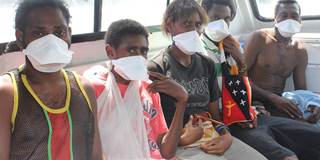As devastating as last year's Ebola outbreak has been, its death toll of less than 20,000 people is dwarfed by that of preventable diseases like AIDS, tuberculosis, and malaria, which together caused more than three million deaths in 2013. Addressing these diseases, it turns out, would be an extraordinarily good investment.
COPENHAGEN – West Africa’s Ebola epidemic has dominated headlines for much of the last year. But, as devastating as that outbreak has been, its death toll of less than 20,000 people is dwarfed by that of preventable diseases such as AIDS, tuberculosis, and malaria, which together caused more than three million deaths in 2013, hitting the world’s poorest people the hardest. This need not be the case; indeed, addressing these diseases would be an extraordinarily good investment.
The truth is that we lack the resources – both human and capital – to solve every problem the world faces, so we must focus on the areas where we can do the most good. That is what 193 national governments are currently attempting to do as they create a set of development objectives to be achieved by 2030. To help guide these efforts, my think tank, the Copenhagen Consensus Center, has asked 60 teams of top economists to assess some of the key targets, and to make an economic case for which of them should be on the final list.
Health is a big topic, so it was addressed by six expert groups and eight commentaries – which, taken together, cover a lot of analytical ground. But one objective stood out as particularly cost-effective: tackling deadly preventable diseases.

COPENHAGEN – West Africa’s Ebola epidemic has dominated headlines for much of the last year. But, as devastating as that outbreak has been, its death toll of less than 20,000 people is dwarfed by that of preventable diseases such as AIDS, tuberculosis, and malaria, which together caused more than three million deaths in 2013, hitting the world’s poorest people the hardest. This need not be the case; indeed, addressing these diseases would be an extraordinarily good investment.
The truth is that we lack the resources – both human and capital – to solve every problem the world faces, so we must focus on the areas where we can do the most good. That is what 193 national governments are currently attempting to do as they create a set of development objectives to be achieved by 2030. To help guide these efforts, my think tank, the Copenhagen Consensus Center, has asked 60 teams of top economists to assess some of the key targets, and to make an economic case for which of them should be on the final list.
Health is a big topic, so it was addressed by six expert groups and eight commentaries – which, taken together, cover a lot of analytical ground. But one objective stood out as particularly cost-effective: tackling deadly preventable diseases.